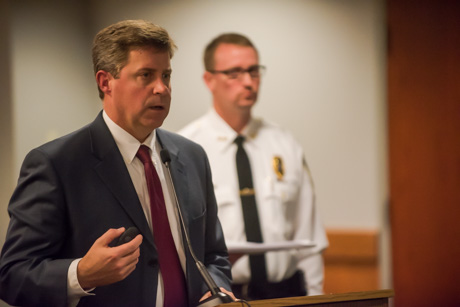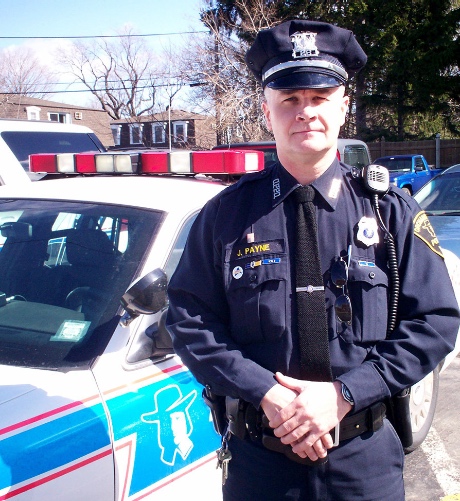All too often a person with a mental illness cycles in and out of the criminal justice system, never really getting the kind of assistance he or she needs to break the pattern.
They may stop taking their meds, get high on drugs or alcohol, and wind up committing a crime. They are no less culpable for their actions, but they can make better choices, move forward and be less likely to get into trouble, if they plug into the many resources available to them in Genesee County.
So say the proponents of the Mental Health Treatment Court, which is a new division of Batavia City Court. It accepted its first case last June, before being officially designated as a mental health court in November.
On March 23, an opening ceremony will take place at the courthouse with many of the stakeholders present, including the Hon. Robert J. Balbick, who also presides over city and drug treatment courts and the "veterans' track" cases.
He has spent 20 years on the bench and during that time has seen the growth and advancement of treatment courts.
"People who have mental-health issues, traditionally, haven't been dealt with effectively by the criminal-justice system," Balbick said. "People with a mental illness will not respond in the same way to ideas, programs, etc., as a person without a mental illness.
"We run our court differently. We're trying to encourage, to put people in a place where they can take control of their lives. We are not as coercive. ... Mental health is different than other treatment courts and the (public) response to it is different than others."
Chief Court Clerk Linda Giambrone said the plans for the opening are definately unlike any other held at the courthouse to date. A flautist will play softly before and after the ceremony, a classical guitarist is being sought to perform and art works produced by the mentally ill will be showcased. There's a brunch reception afterward.
"Sometimes the treatment courts are seen as 'soft justice,'" Balbick said. "But they're not. We make that person accountable -- maybe financially, certainly to the community. Hopefully, the person doesn't recycle back into the system. I'd rather see them go through the treatment process."
That process typically begins with recommendations from law enforcement, the public defender's office, doctors and other professionals. Resource Coordinator Nicole Desmond, who has a strong background in the mental-health field, reviews these and is part of a team which evaluates whether a defendant is a good match.
The team includes representatives from Genesee County Mental Health, Mental Health Association in Genesee County, ACE Employment, Horizon Village Recovery Center, GCASA, Atwater House, Genesee Justice, the D.A.'s office, public defenders' office and assigned counsel.
Desmond's job at the courthouse is to bring together a variety of providers and services to address these unique and often complicated cases.
"With the decentralization of psychiatric hospitals, people have fallen through the cracks," Desmond said. "I think this is a positive way to get people to take better care of themselves."
Of course, the major of people living with mental illness never see the inside of a courtroom because they've never broken the law. They are productive citizens who hold jobs, go to school, raise families, etc., despite their diagnoses.
The prime candidate for mental health court has committed a crime but is not a threat to others. It has been determined he or she has mental health issues that are biological in nature, apart from any other issues, like behavioral problems and substance abuse, which often compounds the complexities of these cases.
Currently, 11 people are participating in the mental health treatment court, which is held from 3 to 3:30 p.m. on Thursday in the Batavia City Court. Their diagnoses include: traumatic brain injury, mental retardation, developmental delays, post-traumatic stress disorder and serious mental illness. Eight of the cases also have an alcohol and/or substance abuse diagnosis and are active in outpatient treatment.
For now, only people eligible to have their cases heard in Batavia City Court can participate. But if someone say, from Pavilion, also had a diagnosed substance abuse problem, a recommendation for mental health court could be considered.
"We give people opportunities to link to treatment to help themselves," Desmond said. "We focus on treatment, we monitor them and help them stay connected rather than just getting into trouble and going to jail. Somebody can live with mental illness but they function better if they are plugged in."
With the exception of hiring Desmond, there have been little or no public expenditures to create and run the mental health court, according to the judge. He admits it means more work for the public defenders' office, because the cases are often more complicated and therefore more time consuming.
But the other key entities are already in place and operating. It's just a matter of pulling the resources together, like working a puzzle, to get the best outcome, the judge said.
People who receive or qualify for SSI, Medicare and Medicaid don't have to worry about paying for treatment, thanks to taxpayers, who also foot the bill for the costs of incarceration.
But the working poor, those with only catastrophic health-care coverage and those who can't afford to pay high co-payments struggle the most in trying to fund their mental health treatments. A "sliding scale" based on the ability to pay helps.
One of the biggest problems the Mental Health Treament Court faces is the lack of bed space for treatment and the availability of housing.
"It's a systematic problem," Balbick said. "One thing that's not available here is a crisis center. In an emergency situation, our options are limited to incarceration or a civil commitment to a hospital. That's one of our challenges."




